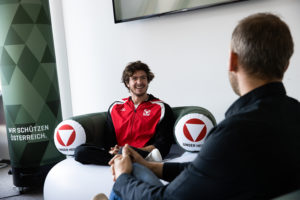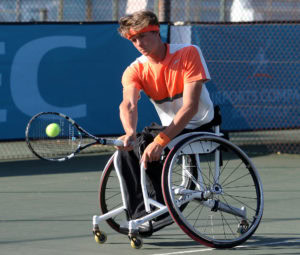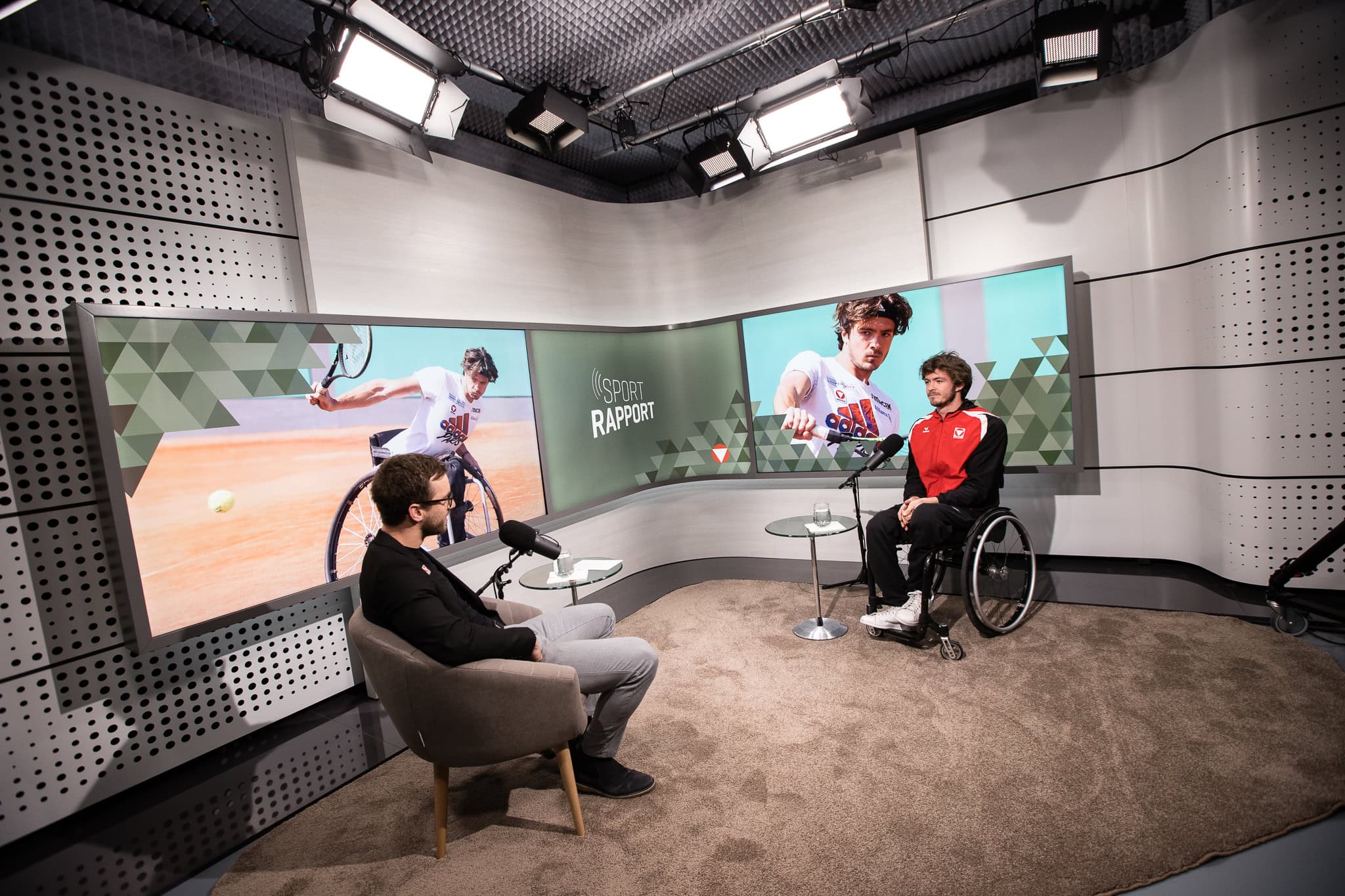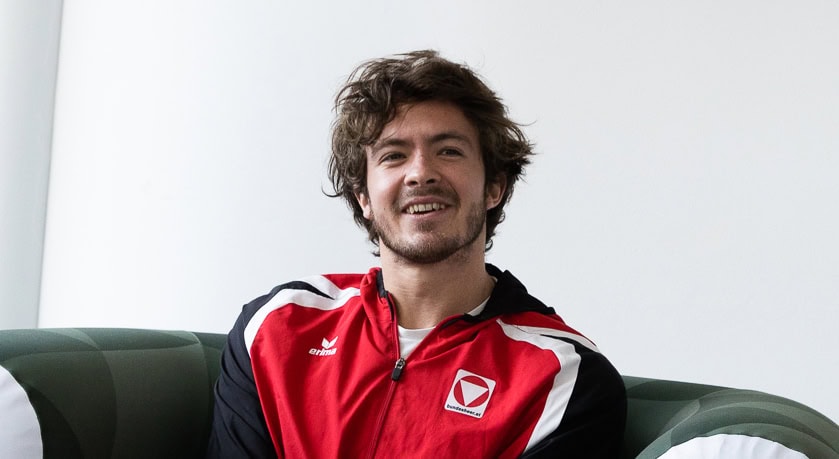Army athlete Nico Langmann is one of the world’s top wheelchair tennis players. We spoke to the Olympic starter about his career, his sport, his coach Wolfgang Thiem and his relationship with the Austrian Armed Forces.
Mr. Langmann, you are one of the top wheelchair tennis players in the world and are currently ranked 30th. Assuming you compete against tennis players without disabilities, how much could you keep up?
My biggest handicap is the court coverage. I can swing the racket quite quickly, and serves can also be very fast – although the angle is much flatter. The bottom line is that every tennis player can definitely have fun with me and a good game will always develop. I’ve also played with Dominic Thiem and was able to warm him up quite well. (laughs)

You have been part of a training group with Dominic Thiem and his father Wolfgang in Traiskirchen for around a year and a half. How has this helped you in your sporting career?
It is unique in the world that a wheelchair tennis player trains in the same environment and with the same coach as a top professional. This is of course a great opportunity for me in sporting terms, but it is also a great sign to the outside world that the elite of domestic tennis – regardless of whether someone happens to be in a wheelchair – is training together. It would be great if this could be implemented in a similar way elsewhere.
Who do you train with? Are there also other wheelchair tennis players there?
No, I’m the only one, which is of course why I mainly play with players without disabilities. But then I don’t make any difference, I play against 15- or 16-year-old junior players as well as experienced top players. Tennis drills can always be designed in such a way that they are a challenge for both players. You are currently number 30 in the world rankings, but have already been ranked 18th. To what extent is it a goal for you to get there again?
I currently see myself somewhere between tenth and 20th in terms of performance, but it was clear that it would take some time before I was able to perform at my best after changing coach to Wolfgang Thiem a year and a half ago. We made a few changes to my game back then, which can’t work overnight, but will help me progress in the long term.

What is it about, for example?
It’s a lot about technique: for example, we changed grips and made movements clearer and different so that I could put more power behind the balls. I then dropped down a few places in the rankings and just as things were starting to improve, corona intervened and I was no longer able to bring my performance to the court. I’ve certainly improved as a player, but now I need tournaments where I can prove it. Apart from the Grand Slam tournament in Australia, where only the top eight players qualify, there was only one tournament that I was able to play in the first quarter. I hope that there will be a few more tournaments between now and the Olympic Games in Tokyo so that I can get some match practice and test myself against opponents.
If only the top eight in the world are eligible to compete in the Grand Slam tournaments, then it should be a goal to get there, right?
Definitely. Of course, it would be a dream to be there one day and I’m aiming for this goal in the medium to long term. However, the ranking in wheelchair tennis can only be influenced to a certain extent, because it’s not just your own performance that is decisive. How the others play is also important. That’s why I prefer to set myself performance-related goals, such as improving my fitness, my stroke quality and safety – then the results will come naturally anyway.
You mentioned the Olympic Games in Tokyo. After Rio, this will be your second time at a major event – what are your expectations?
Rio was definitely a great experience, but I hope that things will be different now, especially from a sporting point of view – I was eliminated in the first round in Rio. The advantage is that I already know how it works there and how the whole situation affects my own performance. I can definitely build on that and then we’ll see how far we can go.
Is a medal possible if everything goes perfectly?
If everything goes perfectly, why not? It would be a surprise, of course, but never say never. The density in wheelchair tennis is very high, basically anyone can beat anyone, although wheelchair tennis is one of the few disabled sports without a classification system, which is a disadvantage for me.
In what way?
Normally, disabled athletes compete in different classes depending on their degree of disability. This is to guarantee more equal opportunities: Someone who is paralyzed from the eighth thoracic vertebra downwards, like me, for example, has much less musculature available than someone who is paralyzed from the fifth lumbar vertebra downwards, and therefore has certain disadvantages. But wheelchair tennis doesn’t take this into account, there is only one ranking list and someone who has no hip stability may be playing against someone who “only” has hip damage and even walks around in everyday life. Eight players in the top 10 can go. This is unfair from a purely sporting point of view, but it makes the ranking clearer to the outside world and the sport easier to market.

How does the army help you in your daily training and in your career?
The army is the reason why I continued after Rio. After my A-levels, I spent a year trying to get to Rio and get the qualification, which meant that my financial resources were exhausted. When the opportunity arose to join the army and start again with a permanent position and insurance, I naturally accepted. This allows me to concentrate fully on the sport and pursue my goals.
Thinking the other way around: To what extent does the army also benefit from you?
It’s very cool how disabled sport is now present in the public eye. I always analyze this and last year I came up with an advertising value of 650,000 euros. The Armed Forces logo is on my chest at every appearance, so of course the Armed Forces also benefit from me – if only because this creates a positive image transfer. From my point of view, the partnership with the Austrian Armed Forces is a classic win-win situation that has nothing but advantages for all sides.
Program tip: On May 10, Nico Langmann will be a guest on the Austrian Armed Forces podcast “SportRapport”. Click here to all programs.










